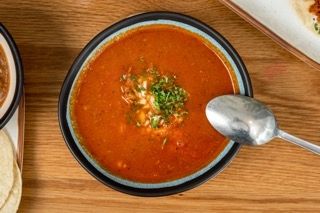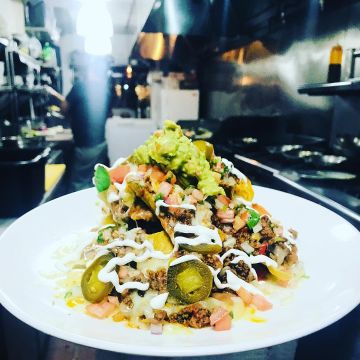Experience artisanal style with hand crafted margarita crafted fresh daily
Wiki Article
Is Mexican Food Healthy And Balanced? Unloading the Nutritional Perks of Traditional Ingredients
The concern of whether Mexican food is healthy invites an exploration of its standard components. Beans and corn function as foundational staples, abundant in healthy protein and fiber. Avocados give advantageous fats, while different herbs and seasonings include taste and health and wellness benefits - take out and delivery. Together, these components produce a tapestry of nutrition. Nevertheless, the healthiness of Mexican cuisine commonly depends on preparation methods and part sizes. What duty do these variables play in identifying its total nutritional value?The Power of Beans: Protein and Fiber-Rich Staples
Although commonly neglected, beans act as a cornerstone of Mexican food, providing a wide range of dietary advantages. Rich in healthy protein, they are a superb plant-based option for those seeking to meet their dietary protein needs. This high healthy protein material sustains muscular tissue fixing and development, making beans very useful for both vegetarians and meat-eaters alike. Furthermore, beans are an outstanding source of dietary fiber, which helps in food digestion and promotes a feeling of volume, potentially aiding with weight management.The range of beans used in Mexican dishes, such as black beans, pinto beans, and kidney beans, adds to a diverse taste profile and can improve dishes nutritionally. Beans are reduced in fat and have crucial vitamins and minerals, consisting of magnesium, iron, and folate. Together, these features make beans an essential component, providing both nutrients and nutrition in traditional Mexican fare.

Corn: a Versatile Grain With Nutritional Perks
Corn sticks out as a functional grain basic to Mexican cuisine, celebrated not just for its cooking applications but additionally for its excellent dietary profile. As a primary active ingredient in meals like tortillas, tamales, and pozole, corn provides crucial nutrients that contribute to a balanced diet regimen. Rich in carbohydrates, it offers as a considerable energy resource, while also being reduced in fat, making it a favorable alternative for various dietary needs.In addition, corn is an excellent source of dietary fiber, which assists in food digestion and advertises satiety. It contains substantial amounts of vitamins such as B-complex vitamins, which are important for basal metabolism. The existence of anti-oxidants, especially carotenoids, adds to general health by lowering oxidative anxiety. In addition, corn is gluten-free, accommodating those with gluten sensitivities. On the whole, the nutritional advantages of corn highlight its importance in standard Mexican food and its duty in a healthy and balanced diet regimen.
Avocados: Healthy Fats and Nutrients in Every Bite
Avocados play a considerable function in Mexican cuisine, matching dishes with their luscious texture and rich taste. Past their culinary charm, avocados are celebrated for their excellent nutritional profile. They are a rich resource of healthy and balanced monounsaturated fats, which can aid reduced poor cholesterol degrees and assistance heart wellness. Furthermore, avocados are loaded with essential nutrients, including potassium, vitamin E, and B vitamins, adding to general wellness.The high fiber material in avocados aids digestion and advertises satiation, making them a valuable addition to any type of dish. Their one-of-a-kind nutrient make-up can likewise support skin wellness and provide anti-inflammatory benefits. Integrating avocados right into standard Mexican dishes or enjoying them as a standalone snack can boost both taste and nutrition, showing why they are a cherished staple in Mexican food. In general, avocados provide a scrumptious means to appreciate healthy and balanced fats and critical nutrients in every bite.

Spices and Herbs: Flavorful Health And Wellness Boosters
While appreciating the abundant tastes of Mexican food, one can not neglect the necessary function that spices and natural herbs play in improving both preference and health and wellness. Active ingredients such as cilantro, oregano, and chili peppers not just contribute to the vivid taste profile but also provide significant health and wellness advantages. As an example, cilantro is recognized for its cleansing residential properties, aiding to eliminate heavy steels from the body, while oregano is loaded with antioxidants and has anti-inflammatory effects.Chili peppers, a staple in many Mexican recipes, include capsaicin, which has actually been linked to boosted metabolic rate and pain relief. In addition, seasonings like cumin and coriander support digestion and might aid in blood sugar law. Integrating these tasty health and wellness boosters right into dishes not only improves the culinary experience yet also advertises total wellness, making Mexican food not just scrumptious, however also nutritionally useful.
Traditional Cooking Techniques: Enhancing Nourishment and Flavor
Standard food preparation methods in Mexican food play a necessary duty in improving both nutrition and flavor, as they typically focus on classic techniques and fresh components. Techniques such as nixtamalization, where corn is saturated and cooked in an alkaline option, not just improve the nutrient profile of tortillas however likewise boost their digestibility - New York Times rated. Additionally, the usage of slow-moving food preparation approaches, like cooking or braising, permits flavors to blend magnificently while preserving the integrity of the active ingredients
Often Asked Concerns
Are Mexican Food Portions Commonly Larger Than Other Foods?
Mexican food parts are typically bigger than those of several various other foods. This particular reflects traditional dining techniques, highlighting communal sharing and hearty meals, which can lead to an extra considerable serving size in general.
Just how Does the Preparation Method Affect Healthfulness of Mexican Food?
Prep work methods greatly influence the healthfulness of Mexican food. Strategies such as barbecuing or steaming protect nutrients, while frying can increase unhealthy fat material. Choices of active ingredients and cooking styles eventually establish overall nutritional worth.Can Mexican Food Be Tailored for Details Dietary Constraints?
Mexican food can undoubtedly be tailored for specific dietary restrictions. Replacements, such as making use of corn tortillas for gluten-free diets or integrating even more veggies, enable people to delight in typical flavors while accommodating various dietary demands.What Prevail Misconceptions About Mexican Food and Health And Wellness?
Common misconceptions about Mexican food consist of the belief that it is inherently harmful, excessively zesty, and exclusively concentrated on fats. In truth, conventional meals frequently include nutritious active ingredients and can be customized to different dietary needs.Exist Healthier Options at Mexican Restaurants?
Healthier options at Mexican restaurants commonly include barbequed meats, beans, and fresh vegetables. Picking dishes that highlight entire ingredients and preventing heavy sauces can result in a much more nutritious eating experience, advertising general health.The range of beans utilized in Mexican recipes, such as black beans, pinto beans, and kidney beans, contributes to a diverse taste profile and can boost dishes nutritionally. Avocados play a considerable function in Mexican food, complementing recipes with their velvety texture and abundant flavor. Integrating avocados right into typical Mexican recipes or appreciating them as a standalone treat can improve both taste and nourishment, showing why they are a precious staple in Mexican cuisine. While enjoying the rich tastes of Mexican food, one can not forget the essential function that spices and herbs play in boosting both preference and health. Standard food preparation methods in Mexican food play an essential function in improving both nutrition and taste, as they frequently focus on fresh mexican food ingredients and classic methods.
Report this wiki page